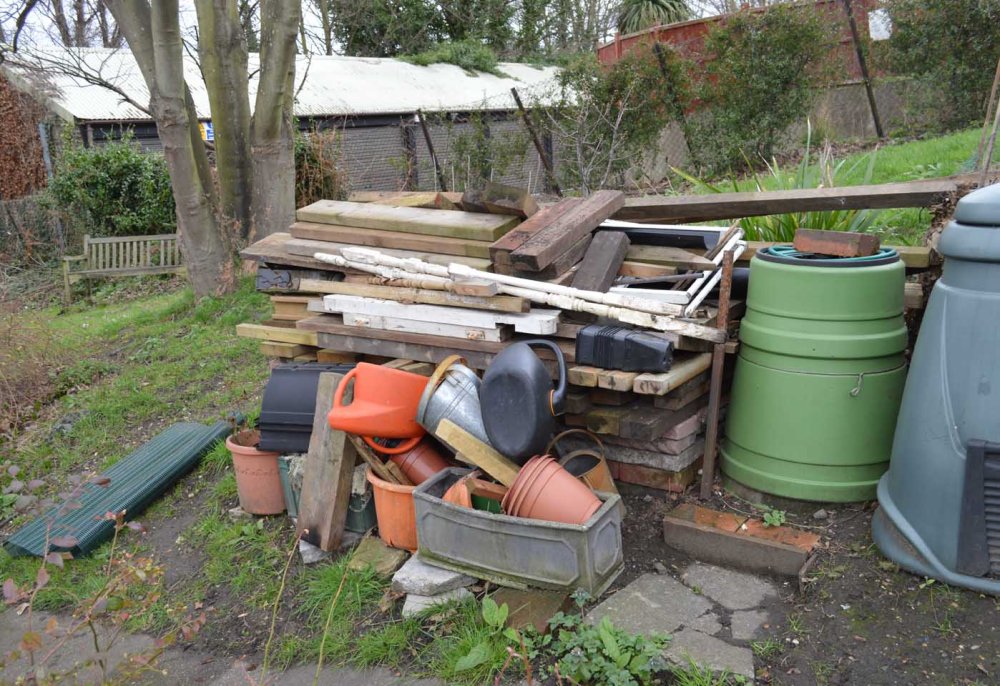Following on from my previous post about skip-diving, I thought I’d bang on a bit more about my worst habit. There is much to be gained from nosing round First World Human Detritus – and it’s not all tangible loot. Skip-tenets hold true for Life. To master the art of Skip-Diving is to master yourself.*
*Not really, but it sounds good, doesn’t it…

I am always shocked by what people chuck out. Sure, they don’t habitually throw away the sort of things they used to in the past – ever since ebay and Cash in the Attic most genuine antiques don’t make it to the bins any more (and yes, they used to). Of course this is a Good Thing but really – I still get some jaw-dropping finds.
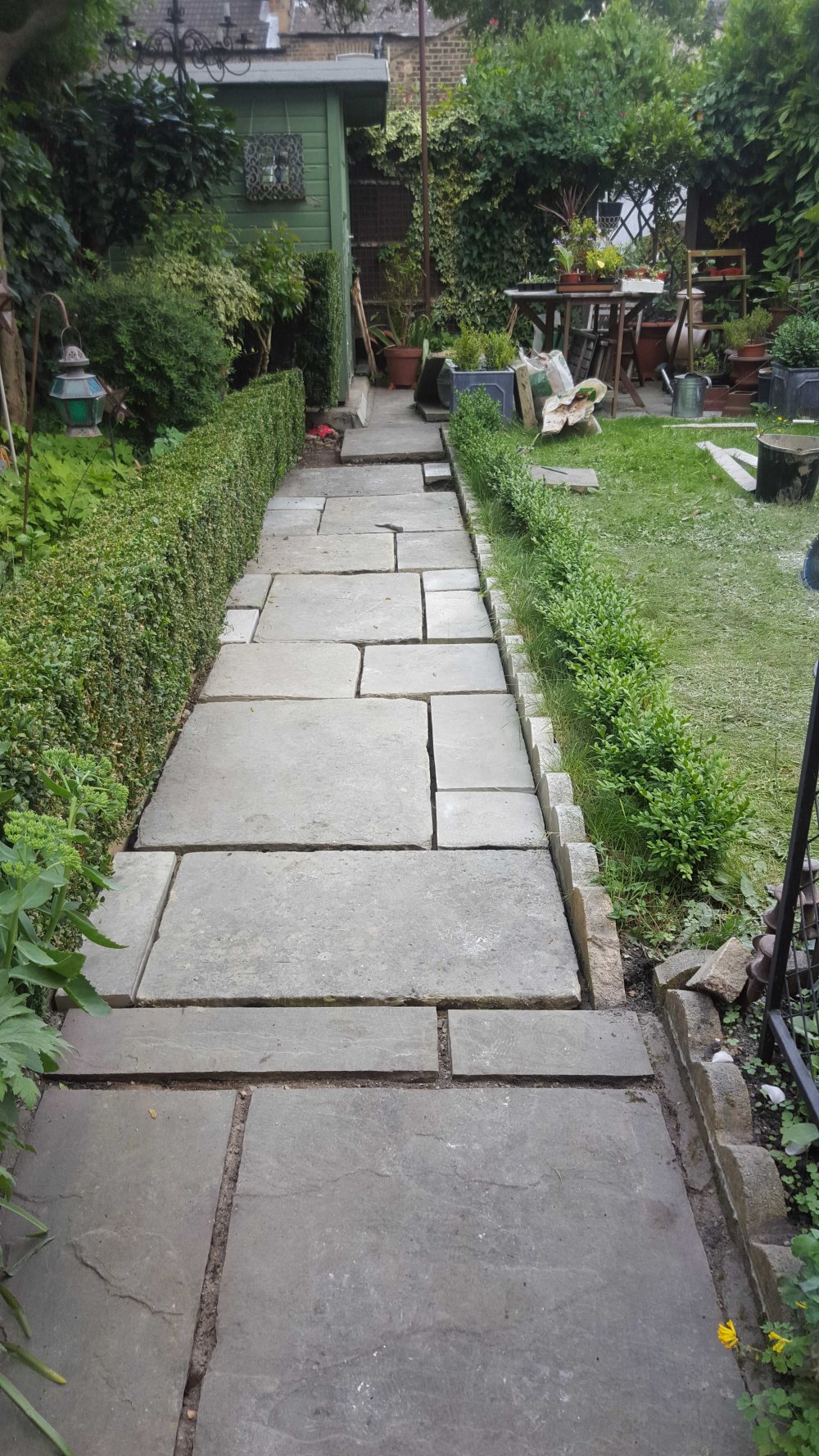
Before I get on my high horse about our Wastrel Society, there are many circumstances that will just make people ‘just get a skip and chuck the lot of it’.
Sometimes it’s laziness but there are other, sadder reasons, often to do with bereavement. I know, I’ve been there myself. In my own case that particular job remains ongoing as it’s painful but I can’t bear to throw good stuff away when others might be able use it, so I’m taking my time. Many can’t afford that luxury. Their only way is Skip.
Which is where diving belles like me come in.
As Skip-Season approaches (thanks to spring cleaning and summer loft conversions), there is ever more intriguing builders’ bounty to be had for those with a quick eye, a halfway decent imagination and a mate with a car (though I’ve been known to walk stuff home that’s bigger than me). But never forget that skip diving can teach you more about yourself than you might like to admit…
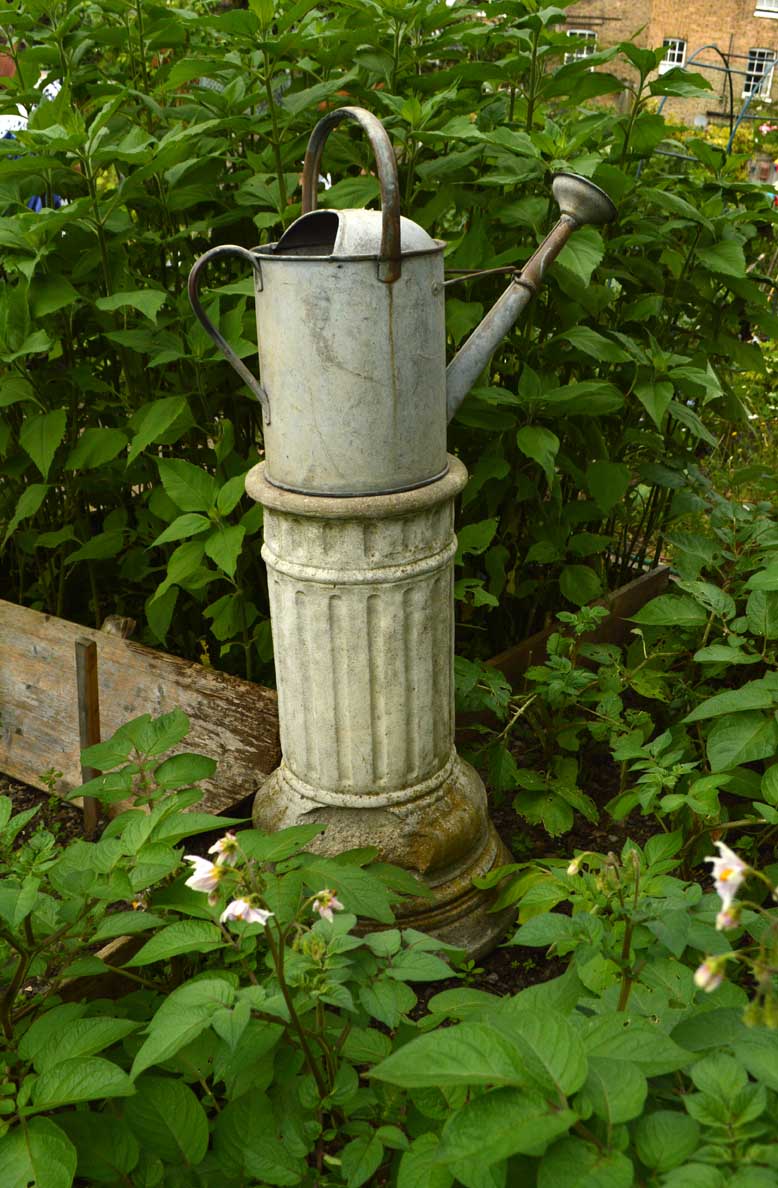
A lot of people will walk past looking the other way rather than be seen nosing into a skip.
I enjoy no such shame but there are a few dos and don’ts to skip divery. So, Ladies and Gentlemen, allow me to present
Sandra’s guide to the delicate art of Skip Etiquette: 18 hot tips for a heavy haul

- (1) Always Ask.
This is the number one rule. Technically if you take something out of a skip, however much it might be classed as rubbish, you are stealing. If you ask permission (nicely), 99% of the time people will be delighted to let you have whatever you like – after all you’re saving them skip-space – if you take enough you may even save them money.
Life lesson: Talking is good.
Be friendly -and sensitive. There may be all kinds of reasons why someone is doing this (see above). Make it easy for them – and yourself. If all fails though,
- (2) Accept ‘no’ for an answer.
And do it with grace. My dad recently had his 1930s leaded light windows replaced. Of course my sis and I wanted the old ones for making funky stuff, so Dad put them aside for us. A professional totter came round (pretending to be a neighbour from around the corner, which didn’t wash – Dad knows everyone in the district…) and harassed him for them, refusing to take no for an answer and becoming quite aggressive (1930s leaded lights fetch decent cash these days). Thankfully Dad was more annoyed than upset but he did admit to feeling the teensiest bit intimidated.
There’s always the chance that stuff in a skip isn’t rubbish. A few months ago I was very surprised to see new timbers on a skip up the road. I knocked on the door and the guy said no, it was for use the next day, the timber was just being stored there. I apologised profusely, hoping that no one else would take it without asking; that sort of thing gives skip-divers a bad name.
Life Lesson: You can’t always get what you want, as Mick Jagger once said, but then again…

- (3) Get over it.
Yes, it’s sort of embarrassing to be seen by your neighbours poking around their paladins.*
*For alliteration purposes only. Just because I nose into skips doesn’t mean I go down people’s bins. Eurgh.
People fear it makes them look desperate or poor or mean.
Yeah, maybe, possibly, okay, definitely – but think about it this way: they they are sending something to landfill that could be reused. They’re probably a bit embarrassed themselves. One neighbour was delighted when I asked if I could have his stuff as he felt less guilty about his self-styled ‘middle-class angst’, chucking still-good, 100 year-old roof beams, even though he had no use for them himself.
Life Lesson: Stop worrying about what other people think.
If you’re really worried, a good way to not look desperate/poor/mean is to make sure everyone knows it’s for your allotment/garden project, not for your home (though of course mine often is.) Here’s a table someone left outside their house. It was there a week before I took pity on it but now I wonder how I ever left it behind; I use it all the time.

The chair, by the way, isn’t from a skip, just a charity shop, with an added cover to hide a particularly manky seat (cleaned, naturally, I’m a skip-diver, not a slattern).
People like the romance of allotments – and it’s a great way to get to know your neighbours. They stop me in the street and ask me how the plot’s doing and in return I distribute gluts with glee. One chap comes to visit his old roof beams on my plot (and have tea).
- (4) Get into it.
If necessary, climb in. Just be sure you are fit enough to climb out again…which brings me to…
- (5) Safety First
Skips are a lethal game of Kerr-plunk. Before liberating something, check nothing else, potentially heavy, sharp or bludgeoning, will be dislodged at the same time, causing an avalanche and risk to life and limb. Before tugging at that lovely-looking railway sleeper, think the action through as thoroughly as if you were playing strip-Jenga in Siberia.
Watch out for nails, which stick out from absolutely everywhere. Wear gloves if at all possible, though I concede it’s not always possible (see next bullet point).
Life Lesson: Think it through, then dive right in.

- (6) Carpe Diem
Act immediately. If it’s worth having, chances are someone else will also think so (not always, see table example above.) I have been known to pull out 10-ft, nail-ridden planks wearing a party dress and heels.
Back in December I was driving back from the allotment, having just bought a Christmas tree and collected greenery from the plot for the house, when I screeched to a halt. A man was standing next to a skip, hovering a wooden chest in mid-air, just about to dump it in.
I asked if I could have it – he said yes – then I made a poor, long-suffering friend wait with it on the side of the road while I nipped home, removed the Christmas tree, holly and ivy from the car and drove back. All that was wrong with it was the hinges; fixed in minutes. Here it is in my living room, currently doing service as a seed-tray. I suspect that had I left it, it wouldn’t have been there when I came back.

Life Lesson: Seize the Day.
(7) Don’t dress for the skip you have, dress for the skip you want to find.
Actually that’s ludicrous. Dress how you like. You never know when you’ll find something, so wear nice clothes, go out, get a life, forget the skips.
Just be prepared to drop everything when you see something juicy. And keep a pair of gloves in the the car, not like these:
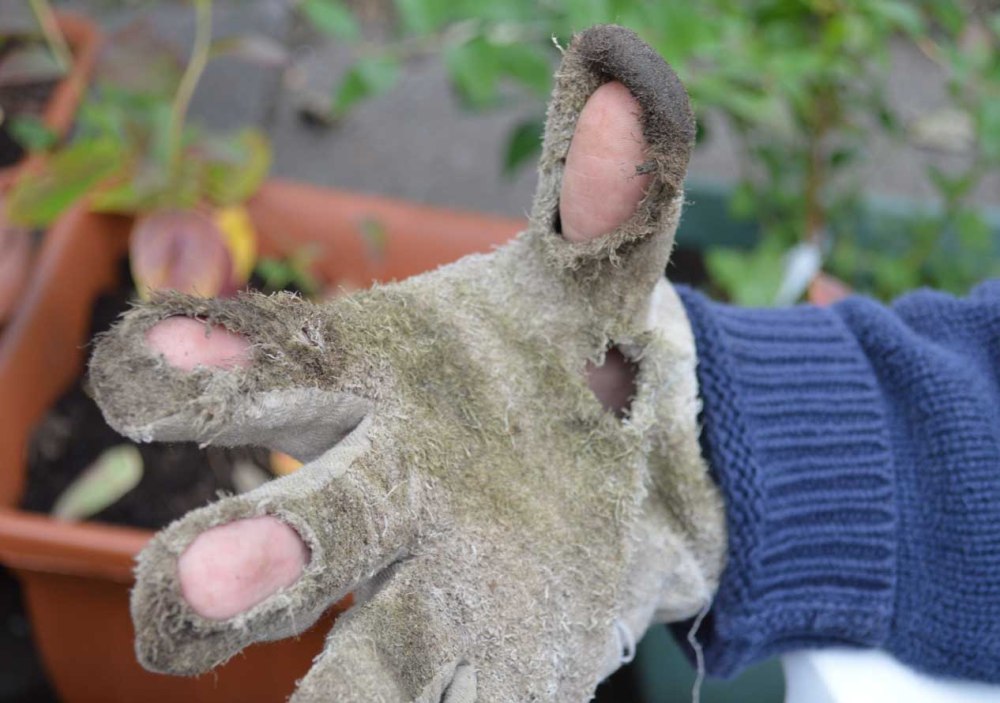
- (8) Sometimes worthwhile things need a bit of TLC.
Here is an old 1950s cocktail cabinet I found on the sodden remains of a bonfire two torrential weeks after Guy Fawkes Night, complete with a burn mark where a Catherine wheel was nailed to it and without doors which had burned away entirely.
 It took 14 years to make it look like this…
It took 14 years to make it look like this…
… admittedly it spent most of that time in my ‘waiting to be done’ corner.
Life Lesson: Patience rewards.
-

Incredibly, the light bulb is the original 1950s-job, which survived a bonfire, two weeks of rain and two house-moves. (8) Don’t forget the basics.
Old bricks, paving stones and even rubble can be useful. Here’s a splendid base my lovely friend Paul made for a bench-to-be, entirely sourced from a skip across the road. You can’t currently see it as, cough, I immediately covered it with the wood pile which is, ahem, still on it.
Life Lesson: Don’t overlook the obvious.

- (9) Think outside the box-ball
Just because something has been used for one thing doesn’t mean it can’t be something else. Look at shapes and strength, not just purpose. Many things, for example, can be turned into plant containers – though an awful lot of genuine pots, often expensive ones, also end up on skips.
Just remove the dead conifer/box ball/geranium that comes free with every discarded flowerpot and voila!

Window boxes often turn up, and I’m convinced there’s an EU regulation that says every skip must contain at least 20 broken plastic plant pots (not worth salvaging of course, but there will also be sound ones).
Old drawers make good seed trays. Guttering is great for starting off peas. Plastic Venetian blinds make fantastic jumbo plant markers. Curtain poles have myriad uses. My cucumber frame is an old umbrella stand. Be as creative as you like.

Life Lesson: Think laterally. Anything goes.
- (10) Eat the whole animal
 Virtually all chucked-out wood comes riddled with nails. Many are worth reusing. No, really – knock ’em out, bash ’em with a hammer and they’re good to go. Then again, many are not. Those aluminium studs used to keep up plasterboard are useless. I am, of course, keen to be proved wrong on this one point, and I have a bunch of them in a pot in the shed just in case.
Virtually all chucked-out wood comes riddled with nails. Many are worth reusing. No, really – knock ’em out, bash ’em with a hammer and they’re good to go. Then again, many are not. Those aluminium studs used to keep up plasterboard are useless. I am, of course, keen to be proved wrong on this one point, and I have a bunch of them in a pot in the shed just in case.
When I had my ‘conservatory’ window replaced I used the old glass for the back of the mini greenhouse. Two circles of the nasty white blank-windows made lids for my water butts (old plastic barrels) using handles found, er, in a skip, and my dad used the last bit to make a block for my sister’s draughty chimney. Nothing was wasted.
Life Lesson: Waste not, want not.
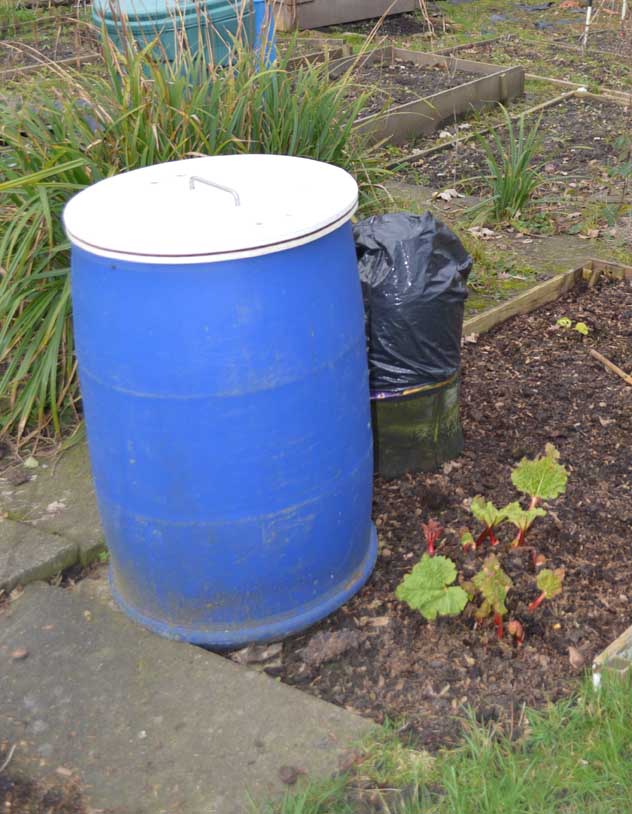
- (11) Ask the Skip Goddess for your heart’s desire…
…Or at least that lump of roofing felt you need to mend the shed.
While you’re always going to be surprised, and should be ready to accept with grace something gorgeous/useful/interesting, don’t be afraid to ask the Skip Goddess for things you need. I suspect the very action of asking for something just makes you more vigilant and notice things you might have otherwise missed but she’s never let me down.
Don’t be greedy – Lady Skip is a generous soul but she’s not necessarily going to grant you your one true love, ancient marble statues or acres of York stone (oh, hang on…)
Just be careful what you wish for – sometimes she doesn’t know when to stop. Like the magic salt grinder at the bottom of the ocean, that ‘little bit of guttering’ I asked for last autumn keeps fetching up even now.
Life lesson: Dream Big (Yes, in my world a lump of roofing felt is ‘big.’ Make of that what you will.)
- (12) You need to kiss a lot of frogs.
Not every skip yields riches beyond the dreams of avarice. Most of them don’t. I peek into hundreds every year and only a handful ever have anything worth salvaging. A regular cry in my world is ‘But it’s full of rubbish!‘ I walk on and keep looking. The secret is persistence. Once every 20-odd paladins, one will fetch up something worthwhile. Once every 50 or so will fetch up something extraordinary. Be patient.
Life Lesson: It’s a numbers game.
- (13) Know what you want to achieve.
Some of my favourite plots are those quirky ones filled with home made sculptures and nutty windchimes. My old plot was a bit like that but now I’ve gone for a more streamlined effect.
I don’t want to recreate the skip in the middle of the allotment, though I will defend to the last those that do. On the other hand…
- (14) There is always room for the truly quirky.

Most extremely (and exquisitely) demonstrated in the House of Dreams.
If you see something really different that makes you smile, you’ll find somewhere for it. Go for it – you’ll never see it again. My own ‘one that got away’ was a neon sign that said Trousers in a shop that was being cleared out. The workmen refused to sell it to me for good money. I saw it smashed in a skip a couple of weeks later.
Life Lesson: Always aim for the Trousers. Even if you never reach such dizzy heights you can dream…

- (15) Accessorise
If you find some old guttering in a skip, don’t forget to see if the brackets ended up in there too. Door handles, catches, hinges etc can all be sourced for nothing.
Then again…
- (16) There are some things best left in there.
Check for stuff that’s dangerous, might have some kind of contamination or safety issue. I’m not sure I need to mention mattresses, baby car seats, cycle helmets and anything that might have unpleasant spores lurking inside – though things that can be thoroughly cleaned with something environmentally unsound might be okay. Use some common sense on that one.
If you’re sourcing something for the house, watch out for woodworm that could infect stuff you already have. If you’re sourcing topsoil, it’s worth sieving for foreign bodies and pernicious weeds.
Don’t bother with anything made from chipboard, hardboard or plasterboard. It rots as you look at it. Pine will not last very long either. This pretty much includes anything peddled by IKEA.
Don’t take carpet, thinking it will stop weeds. It will – for a while, but very few carpets are made from natural fibres these days. As synthetic carpets rot, they don’t fade into lovely compost, they become a tangle of nasty nylon. Weeds grow through them, making the problem even worse. Then you give up your plot in disgust, leaving the next poor plotholder to get a skip – and a hernia – of their very own.
Life Lesson: Some things are free, yet remain too expensive.
- (16) Leave a skip in a better condition than you found it.
Leave it neat and safe for all, and that includes the area around it. Tidy up after yourself. If you can’t get something easily and without causing mess and inconvenience to others let it go. It’s a piece of rubbish in a skip, not a gold nugget.
Life Lesson: Keep Britain Tidy.

- (17) Share the love.
Make sure that anything you don’t need/want, either from the skip or your own life, at least has the chance of a new home. If you’re in an area with footfall, you may have a system where people put stuff out on the pavement for others to take – I got rid of all the seeds I didn’t need last weekend in a matter of minutes.
Be realistic – no one wants your ancient printer, 1980s exercise videos, filthy mattress or creepily broken children’s toys (save perhaps, the House of Dreams. See above). That’s fly-tipping.
Don’t be a litter bug – if no one’s taking it, dispose of it quietly and responsibly – and NOT in someone else’s skip (unless they say so).
Freecycle is good – for every flake that doesn’t turn up/ is rude / doesn’t even say thank you there are ten people who are genuine. I once got rid of a bucket of 100 year-old soot from a chimney that had just been reopened to a chap who then brought me a bag full of produce from his allotment.
Charity shops are also good. I always have a charity shop bag on the go, and take it up to my local hospice shop before it becomes a chore.
Life Lesson: There will always be someone who thinks your rubbish is treasure.

- (18) Don’t turn into Albert Steptoe.
The One Rule to rule them all: Know when to stop.
Salvaging can be addictive but there will come a time when you don’t need any more wood.
Stop. Walk away from the wood. Give away the rest of what you’ve already got and no longer need and stop taking more.
When, sometime in the future, you have a new project there will be other bins; you do not need to hoard this lot. For better or for worse:
Life Lesson: We have not yet reached Peak Skip.
 I’ll be clearing my own woodpile soon. Honest. I can do it any time I want. Yes.Soon.
I’ll be clearing my own woodpile soon. Honest. I can do it any time I want. Yes.Soon.
I’m a recovering hoarder. I no longer squirrel stuff in my house (some would disagree…) but I find it very hard to pass a skip full of decent beams.

So I have compromised. I leave the wood in the skip but always just take a peek in case there’s something good – for example last summer I found a skip full of bolts of cloth – sadly most of it was inaccessible but I took what I could, gave most of it away and am still making things from the rest. That was a good day.
For the rest, well, I’m working on it. I’ll let you know when the woodpile finally goes. It will be a day of liberation, celebration and yes a little melancholy, but I fear it will not cure me of the Joy of Skips.
